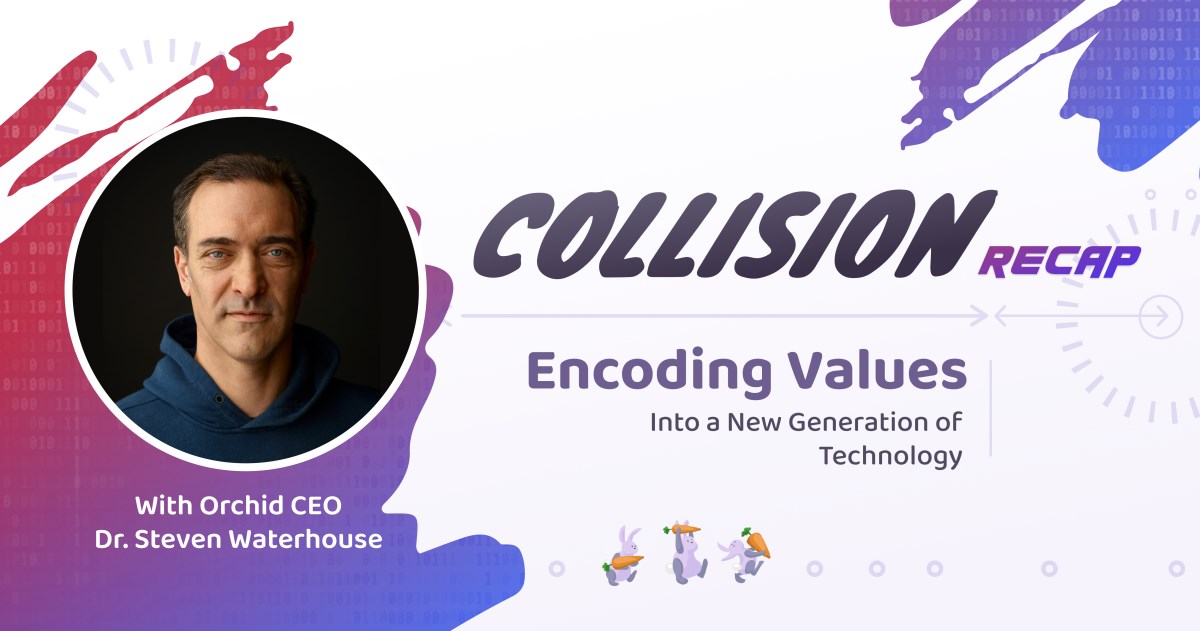
Orchid CEO Dr. Steven Waterhouse Speaks at Collision 2021
Apr 28, 2021On April 22, Orchid co-founder and CEO Dr. Steven Waterhouse (Seven) spoke at Collision Conference, one of the largest tech conferences in the world. Seven's talk focused on the ways values shape technology -- whether we realize it or not -- and how we can build a better future by encoding the right values into the tech we build. Specifically, he explored the potential of the Internet to create a more fair and equitable world.
A "Failed Utopia"
When the internet was created, it was intended to be an "open, free, enriching digital space that broke down walls and empowered the voiceless," Seven explained. But over time, the reality has evolved into something quite different.
"The Internet has become a failed utopia," Seven said.
The web has gradually transformed into a centralized space largely controlled by a few powerful institutions. These institutions use the web as a way to profit off of "surveillance and division." The pace of this transformation accelerated around 2010, when social media began to take on an increasingly important role in society.
Capitalizing on outrage
Over the past decade, a small group of companies has gained an immense amount of power over the web. These "FAANG companies," Seven said, "enjoy something like a monopoly across the primary axes by which people use the Internet."
How have these companies become so powerful? Essentially, they have figured out how to capitalize on human emotion -- primarily, outrage.
"The current status quo has come to operate based on an extractive business model in which the user is the product," Seven said. "Internet giants tailor our digital realities based on our observed habits, reinforcing division, atomization, and misinformation in order to generate revenue."
How do they do this? It starts with our data.

The Internet's extraction economy
Non-consensual data collection on the Internet is so ubiquitous that many users hardly give it a second thought. But the problem isn't just that it's non-consensual; there are also concerns about the way that this data is stored. Because the web is centralized, Seven explained that data security is vulnerable to manipulation and technical failure.
Additionally, the way that our data is handled is opaque. Once a platform collects data from users, people have no control over how it is used. "The data practices and decision making processes of large tech companies are not broadly understood by the average person," said Seven.
Building a new Internet with human values at its center
How do we reverse the Internet's long march toward division and centralization? "We need to rethink the values we build into our technology," said Seven.
He explained that while many may believe that the Internet is "values-agnostic," the truth is that the divisiveness of the contemporary web is encoded in the algorithms that run it. In order to change the status quo, the underlying technology must be intentionally reimagined.
Seven identified six specific values to emphasize when we build digital platforms: privacy, exploration, equity, openness, freedom, and individual sovereignty. Each of these tenets represents a single element of a multi-faceted goal: to make the Internet a free, accessible place that drives connection, unity, and understanding.
This is not an either/or proposition, in which redesigning the web with human values at the center requires people to sacrifice economic gain. "Using blockchain technology in particular, we can build profitable businesses that expand access as well as economic opportunity without compromising on our other core values," he said.
There are a number of organizations that are already doing this work. Seven showcased examples of some of these projects, including Aztec, Nodle.io, New Design Congress, Nym Technologies, Bundle Africa, Electric Coin Company, Bridgefy, and The Commons Project.
Using blockchain technology, Orchid has also been intentionally designed around the six core values Seven outlined. Orchid is open-source and decentralized, and uses an innovative payments system called probabilistic nanopayments to incentivize bandwidth providers and ensure users always enjoy fast connections. And now, people can use Orchid for as little as $1.
"Our mission is privacy, and to achieve it we have designed Orchid as a privacy solution with a goal of reclaiming the Internet as a place of freedom, exploration, and safety," he said.
If you enjoyed this blog, subscribe here for privacy news, commentary, and product updates from Orchid.



